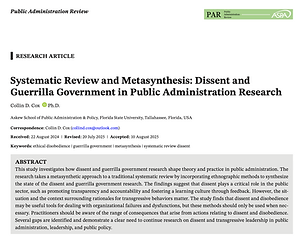RESEARCH
Publications

Note: Pre-published copies will be available for free access in an online repository (not yet available). Please email me for a free copy in the interim.
Overview
Research Interests & Contributions
My research interests are diverse, and my expertise aligns with three primary arenas: (1) public management, (2) ethics and leadership, and (3) social justice, equity, and organizational theory. In each arena, my research focus centers around the role of conflict and disobedience in the public sector. The purpose, however, is to understand the potential social and structural solutions to certain institutional failures and organizational dysfunctions. Although these three arenas overlap, I list public management first as much of my research goals are to understand the ways in which public organizations can improve (policy, leadership, service delivery, etc.). With much of my professional experience being in higher education administration, a subtheme of my public management research is aligned with higher education administration and in improving public service education and leadership (in tandem with public service functions and management). In a study published at Public Management Review, I find that factors relating to the implementation of poor policy or among leadership directives and behaviors may influence an employee’s willingness to dissent. The goal of this research is to understand what mechanisms can be adopted to improve feedback loops and subsequently improve public leadership and policy.
The second research arena I am particularly interested are the ethical and social factors that shape or influence public management and leadership in the public sector. As mentioned, in both my dissertation and my ongoing research, my research interest largely aligns with a desire to understand dissent and ethical disobedience in the public sector. In my current work on transgressive leadership, I aim to bridge the literature on dissent with leadership to understand how acts of transgression can be employed as temporary leadership approaches to manage failure and dysfunction in organizations. Primarily, in adopting bell hooks’ philosophy from Teaching to Transgress, the aim is to understand transgressive leadership through minority perspectives and experiences and the situations or contexts that such leadership is possible. While the transgressive leadership approach is certainly not desirable, my contribution to public administration research is to understand alternative methods to better ‘deal’ with the ethical dilemmas and wicked problems associated with, for example, poor policy or poor leadership in public organizations.
Finally, my research centers around interest to contribute to and expand social justice and equity research. As my work aims to bridge dissent and transgressive leadership with practical issues in public administration, it is the explicit intent of my research to improve public service for those who are most marginalized and minoritized in society. Much of my research aims diverge from traditional philosophies and paradigmatic assumptions in public administration, such as values relating to bureaucratic rationality and neutrality. In my own critical philosophy, I assume a Waldonian perspective that no public administration is value-neural and that no public service should exist as divorced from values or partisan influence. In consequence, that traditional values of rationality (intentionally or not) ‘neutralize’ the values and perspectives of those most marginalized in society. In my research, I take an agentic approach by centering my research methodology design, methodology, and questions around a need to improve social equity and justice in the public sector. In my most recent collaborative work, Dr. James Wright II and I seek to explore the role of institutional and structural racism in frontline work. In this project, we aim to investigate the ways in embedded racism and racialized practices impacts marginalized frontline workers–particularly in firefighting careers.
My research incorporates both inductive and abductive methods, with the majority of my research aiming to promote theory-building and praxis. For example, I largely work to incorporate participant interviews and ethnographic data to improve contextual and theoretical understandings of certain phenomena relating to conflict and disobedience. My research intends to benefit other quantitative and mixed-methods studies that aim to subsequently test these findings and promote theory in turn. My research is designed to inform and refine public administration theory while also offering explanations that can be directly applied to improve public organizations and service functions. Ultimately, my work aims to not only bridge the gap between theory and practice, but to advance public administration theory and to contribute to tangible outcomes in the public sector.
Dissertation
Examining the Role of Ethical Disobedience and Transgression in Public Management, Leadership, and Public Policy.
Presently, there are a handful of studies that currently explore the role of management in dealing with dissent and other organizational issues relating to, for example, insubordination and guerrilla government in organizations (O’Leary, 2006; 2016; 2020; O’Leary 2010; Borry 2017; Kassing 2011; de Dreu and West 2001; Edyvane 2020). However, fields of leadership, management, and public policy have yet to expound on dissent and ethical disobedience in theory and practice. Specifically, O’Leary (2016; 2020) argues that dissent may benefit public decision-making processes when feedback loops are effectively designed, yet seldom is dissent or transgressive forms of leadership recognized as a viable tool in the public management, leadership, and public policy literature. As such, the present study aims to contribute to the literature—particularly in fields of public management, leadership, and public policy—by synthesizing existing research with findings generated through inductive analysis for the purpose of theory-building and practical problem-solving. The study aims to address three purposively broad questions:
-
How does existing research on dissent and guerrilla government inform public administration theory and practice?
-
What factors lead public employees to dissent in the public sector?
-
What can scholars and practitioners learn from a theory of dissent and transgressive leadership?
